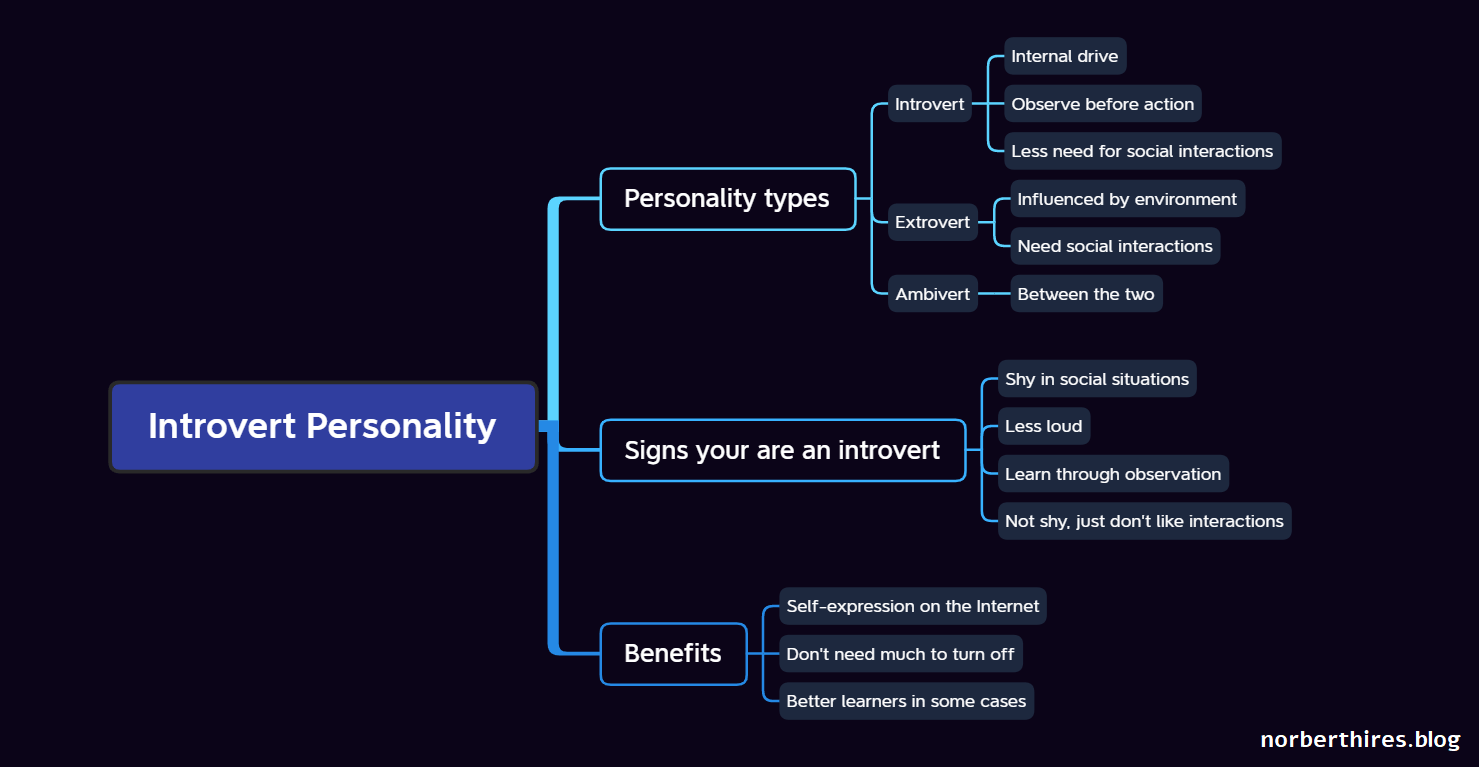Hidden Benefits of Being an Introvert

As early as the first half of the 1900s, Carl Jung described his thoughts on defining personality types, which included the concepts of extraversion and introversion.
I'm introverted.
For a long time, I saw this as a negative trait, but I had to realize I was wrong. One is not better than than the other. Being introverted or extroverted are just the endpoints of a scale. Both personality traits have advantages and disadvantages. By knowing where we fall on this scale, we can consciously work in areas that we are less happy with while making decisions in line with our strengths.
- In what areas does an introvert perform phenomenally?
- What distinctive traits characterize introverted people?
- Are introverted necessarily shy?
- Can we change our personality through conscious work?
I am looking for answers to these questions to better understand myself and help you get to know yourself as well.
What do introvert, extrovert, and ambivert mean?
Psychology has been researching introvert/extrovert for more than 100 years, but recognizing personality traits goes back a long way. Even the ancient Greek physician Hippocrates wrote about temperament personality types (sanguine, choleric, melancholic, phlegmatic), which can be broadly translated into the types known today.
However, introversion and others are observational concepts, not absolute, innate facts.
Based on these observations and their lessons, these typologies can be useful in getting to know ourselves.
- But what characterizes introverted and what characterizes extroverted individuals?
- What is an ambivert?
Introverted meaning
The interest of introverted people is inward: their thoughts, feelings, and actions are motivated primarily by internal factors rather than the outside world. Social interactions drain their energies, but that doesn't mean they would be unsociable. They act after observation, they are thoughtful.
Extroverted meaning
However, extroverted people are interested in the outside world: their thoughts, feelings, and actions are more influenced by their environment. Social interactions fill up the extroverted, they get to know each other easily, they love and they can talk.
Ambivert meaning
Introvert and extrovert are the two ends of a scale, which raises the question: what is between the two?
Jung also accepted the existence of a third category, which we call ambiverts. For ambiverts, it is difficult to determine whether their motivation is influenced by internal or rather external factors. Ambiverts appear to have both introverted and extroverted properties, forming a kind of transition between the two types.
Personality tests and introverted personality
How can you figure out which type you belong to if you didn’t feel like it any of the above-mentioned concepts are suitable for you?
Most personality tests look at your location on the introverted-extroverted spectrum. One of OCEAN's personality traits is extrovert (openness, conscientiousness, extraversion, agreeableness, and neuroticism), but Myers – Briggs type theory also tells you what type you belong to.
The MBTI test examines a person’s preferences in four key areas:
- Managing and receiving energy: Extroverted (E) or introverted (I)?
- Getting information: Do you orient yourself based on observation (S) or relying on your instincts (N)?
- Decision making: Do you prefer thinking (T) or emotions (F)?
- Approach to the outside world: Are you more of judging (J) or perceiving (P) type?

Be careful with categorization
Surely you want to belong to a group. It sounds comfortable to be categorized in a scientifically sophisticated way, you learn about the pros and cons of your personality, and then a random blogger describes why it’s all great, why you’re so great.
However, the situation with introverted - extroverted personality traits is not as simple as you can read about in the top 5 tips for introverted women’s articles.
Before we jump into the block on how to get the most out of life as an introvert, you should know that:
- Introversion/extroversion is a concept created by humans. You don’t have a brain cell in your head responsible for an introverted personality, and DNA doesn’t have much to do with your tendency to sit alone in a dark room. These observational personality traits provide a simple framework for categorizing the infinitely diverse humanity based on behavioral patterns.
- Introvertedness and others represent a spectrum. You will also get a good grade in school for 61% and 98% tests in school, just as there can be a big difference between an introvert and an introvert.
Personality traits of an introvert
Introverted people often feel that they have to meet external expectations, prevail in a world dominated by extroverted while being perfectly separated in their own narrower environment.
The point is that people smarter than me have also researched the behavior of introverted people and identified characteristics that have as many advantages as disadvantages.
For example:
1. Introverted people are shy in social situations
Have you ever felt that the crowd around you is draining your energy pretty slowly? Then you may be introverted too. Introverted people are usually quiet, avoiding social interactions.
This is not to say that introverted people are antisocial, it only suggests that large social gatherings are not situations where an introvert will seek happiness.
Aversion to social situations can negatively affect all introverted people regardless of occupation and life situation. Aversion to the crowd and networking events also prevents you from getting to know great people, even though you feel comfortable with like-minded people and friends.
2. Introverted people are not loud
We just look (or despise) in amazement at the tangible energy, fast speech tempo, loud manifestations, and intense gesticulation of an extrovert that can keep a conversation alive even when we’ve long let go.
Extroverted people speak more, argue more energetically, use and read the nonverbal cues and body language of others better (Akert & Panter, 1988). The advantage of extroverts is not of genetic origin, they only have more experience in social interactions than their introverted counterparts.
Effective communication is therefore an area that introverted people should and can learn, while it is the most natural ability for their extroverted peers.
3. Introverts learn through observation
As long as extroverted people take on challenges without thinking and acquire the necessary knowledge in practice, introverted people tend to learn through observation.
Introverted people like to watch others do an activity until they can repeat what they have seen themselves. When it comes to practice, they would rather test and develop their skills on their own rather than do the same in public.
If you are learning new skills through long hours of observation rather than a series of attempts, you probably have an introverted personality. Although the “trial and error” method has good PR, observation may be one of the superpowers of introverts, to which we will return later.
4. Introverts are not necessarily shy
Once I launch my merchandise t-shirt, the following sentence will be printed on each piece:
"While the shy is afraid of social interactions, the introvert just doesn’t like them."
Introverted people are not shy, they even enjoy the company of people close to them. An introverted person finds pointless chatting, a few minutes of small talk tiring and unnecessary, while appreciating and enjoying deep conversations.
Introverted people like to think through what they hear before forming their own opinion. And this attitude is not the best for discussing the weather.

The hidden benefits of an introverted personality
Having written in the previous paragraphs about almost everything that extroverted people are better than us, now it's time to get to know the superpowers of introverts.
1. Self-expression on the Internet
Amichai-Hamburger, Wainapel, & Fox published their research, "On the Internet No One Knows I'm an Introvert" in which they examined the effects of Internet connections on life.
They have found that introverted people are supported by the internet to find their “true selves”, while extroverted ones are more familiar with themselves through traditional social relationships.
Knowing ourselves and expressing ourselves is not just mischief at the top of the Maslow pyramid, but factors that significantly affect our mental health. The research attempted to dispute the fact that the internet leads to loneliness and depression.
Based on the results, introverted people who did not dare to take on their true selves through traditional relationships for fear of stigma found it easier to open up on the Internet and form valuable relationships with like-minded people.
For introverted people, the Internet is a repository of opportunities that they can make effective use of.
2. The Power of Lonely Leisure
The results of a 1984 study suggest that there is a correlation between our location on the introverted/extroverted spectrum and the type of activities chosen for recreation.
According to Diener, Larson, & Emmons, extroverted people are more likely to choose social leisure activities for recreation, while introverted people are more likely to be energized by lonely activities (what a surprise).
Why would this be a superpower?
Have you ever heard that “I sure wouldn’t be able to read a book” or “I could never just sit and meditate"?
While it may not seem like a large number, it still has a huge potential in that you don’t need almost anything to relax.
To develop self-knowledge, you need silence, inward attention, and thinking, which, as an introvert, is your natural medium.
You can be more immersed in your thoughts, you can become a better observer, which is also useful for creativity. Probably J.K Rowling didn’t come up baking at the garden party with the idea of the dementors, and it also supported George RR Martin to work on his massive books that he otherwise enjoys sitting alone in an armchair and writing.
3. Introverted Learning Strategies
Research on the relationship between personality traits and language learning strategies has found that introverted people use more metacognitive and cognitive strategies (perceptual, comprehension, memory strategies) than extroverted learners [Naci-Kayaoglu (2013)]
Introverted people consciously used goal-oriented methods to acquire, memorize, and retrieve the information they needed, while extroverted language learners preferred to practice with others.
This can ultimately mean a deeper knowledge of the introverted subject and the acquisition of learning strategies such as the method of regular repetition or effective note-taking.
Can Introverts Change?
Introvertedness is a stable point of our personality, in the formation of which environmental influences played as much a role as our genetics. Research on functional magnetic resonance imaging of the brain suggests that introverted and extroverted use different parts of their brains, thus pointing to biological differences between introverted and extroverted.
Regardless, introverted people can learn extroverted skills, for example, an introverted person can be a good actor or push phenomenal small talks in an elevator when practicing these activities.
Tim Ferris, a bestselling writer, podcast host, often mentions that he is an introvert who has learned to behave like an extrovert in a variety of situations.
Learned extroverted behavior poses challenges, allows us to meet new people, and have positive experiences regardless of personality. Of course, that doesn’t mean you’ll love small talk, but if you get better at it, it’ll be less painful and maybe you’ll be able to change the otherwise awkward silence into meaningful conversation.




